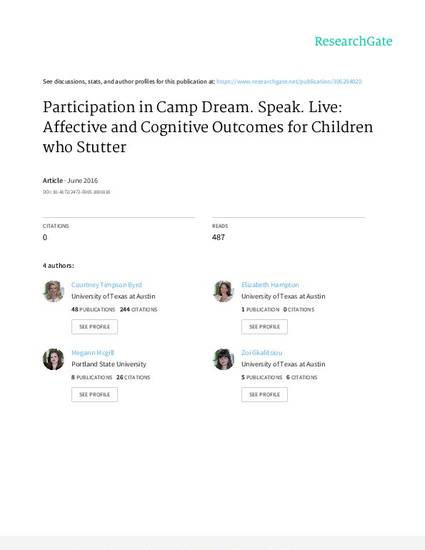
- Stuttering -- Research,
- Stuttering -- Therapy
Objective: The purpose of this study was to explore the influence of participation in Camp Dream. Speak. Live., an intensive therapy program, on the communication attitudes, peer relationships and quality of life of children who stutter. Method: Participants were 23 children who stutter (n=5 females; n=18 males; age range 4–14 years) who attended a weeklong intensive therapy program that was exclusively developed to address the affective and cognitive components of stuttering. Outcome measures included the KiddyCAT Communication Attitude Test for Preschool and Kindergarten Children who Stutter, the Overall Assessment of the Speaker’s Experience of Stuttering (OASES), and the Patient Reported Outcomes Measurement Information System (PROMIS) Pediatric Peer Relationships Form. Parents of children who participated in the program completed online parent proxy versions of the Kiddy-CAT, OASES, and PROMIS approximately one month after their child’s participation in Camp Dream. Speak. Live. concluded. Results: Results suggest that participation in Camp Dream. Speak. Live. led to significant increases in the child’s communication attitude, the child’s perception of his/her ability to make friends, and also significantly reduced the impact of stuttering on the child’s overall quality of life. Additionally, parents of children who participated in Camp Dream. Speak. Live. reported they observed positive increases in their child’s perception of his/her own ability to make friends as well as significant decreases in their child’s perspective of the impact of stuttering on his/her overall quality of life. Conclusion: Results support the notion that significant improvements in communication attitude as well as significant reductions in the impact of stuttering on overall quality of life can be achieved in a short period of time.

Copyright: © 2016 Byrd CT, et al. This is an open-access article distributed under the terms of the Creative Commons Attribution License, which permits unrestricted use, distribution, and reproduction in any medium, provided the original author and source are credited.
*At the time of publication, Megan McGill was affiliated with the University of Texas.